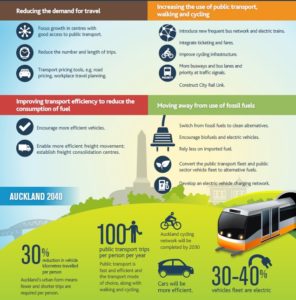
Brief outline of the low carbon town development plan
Auckland has a vision to become the world’s most liveable city. Energy resilience – securing sustained access to clean, efficient and affordable energy – and reducing our greenhouse gas (GHG) emissions are critical to this vision.
A fast-growing population, climate uncertainty, scarce resources, volatile fossil fuel prices and dependence on imported energy are just some of the challenges and opportunities that call for decisive action and innovation.
Transport and electricity account for around two-thirds of Auckland’s emissions. Unless we intervene, our emissions could increase by 46 per cent by 2025 and energy use by 65 per cent in 2040. The Auckland Plan’s aspirational target is to achieve a 40 per cent reduction in GHGs by 2040 (based on 1990 levels).
To reduce GHG emissions emissions by around 5.3 million tonnes, Auckland must transform from a fossil fuel-dependent, high energy-using, high waste society to a mobile, quality, compact city.
Low Carbon Auckland envisions a city with a prosperous eco-economy – powered by efficient, affordable, clean energy and using sustainable resources. This action plan sets out a 30-year pathway and a 10-year plan that will guide the first stage of the city’s transformation towards this low carbon, energy resilient future. It identifies five key areas:
1. the way we travel
2. the way we use and generate energy
3. our built environment and green infrastructure
4. Zero Waste
5. forestry, agriculture and natural carbon assets.
Achieving the interim targets in this plan demands a significant shift from business as usual. Key actions include reducing the demand for travel and fuel consumption through encouraging active modes of travel and public transport use, switching to alternative fuels, accelerated uptake of local renewable energy generation, smart grid networks and sustainable homes and buildings. New initiatives planned include trialling a warrant of fitness for rental properties, a city-wide organic waste collection scheme and an enabling regulatory framework in the Unitary Plan cost effective solutions. The actions will also provide benefits for our environment, including reducing emissions to air, land and water, and the economy and our overall wellbeing. Innovative funding models will also be required to generate finance for these activities.
This is a plan for Auckland and we all have an important part to play. Whether at work, studying or at home, the decisions we make on a daily basis will determine what our collective carbon future looks like. It is not a static document. The plan must be flexible and responsive to the challenges and changes that emerge, and be regularly reviewed. We encourage Auckland communities, businesses, industry, and government to consider this plan as dynamic, facilitating ongoing engagement and collaboration.